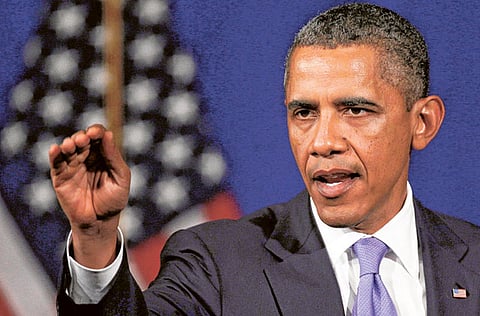How Obama can aid Libya
America should provide the Transitional National Council diplomatic recognition so the people can win their freedom on their own terms

Timidity can cost lives, in war and in diplomacy. The United States and Nato were right to intervene in Libya this spring. Muammar Gaddafi's forces were at the gates of Benghazi, hours away from overrunning the city and brutally ending the Libyan people's struggle for freedom from Gaddafi's 40-year dictatorship.
Libyans will forever remember the US leadership during their hour of great need. They and our allies are watching the debate between President Barack Obama and Congress over who has authority to authorise this mission — which the House has declined to give the president — and whether the president can continue military support.
But separate from the war powers debate, the president could give the Transitional National Council much of what it needs with one diplomatic stroke. The power to recognise successor governments of foreign states lies solely with the executive branch. The president has already recognised the TNC as "the legitimate interlocutor of the Libyan people".
France, Italy, Germany, Canada, Qatar, the UAE, Jordan and others have given some level of recognition. When the president's top diplomat for the Middle East, US Assistant Secretary of State Jeff Feltman, visited Benghazi this month, he found a sense of joy, opportunity and gratitude to the United States unlike anything he had seen in his diplomatic career.
"The TNC seems sincere in its commitment to building an inclusive, democratic Libya that is a partner with us," he wrote.
The State Department invited the TNC to open an office in Washington but noted in discussions this month that it would not be possible to provide access to the Libyan Embassy, its vehicles or its small bank account because Gaddafi has asked that they be preserved for his regime. US officials acknowledge that Gaddafi forces have burned down the US Embassy in Tripoli. Yet the administration continues to stall on providing full diplomatic recognition to the TNC.
Frozen assets
Why wait? Full diplomatic recognition would, first and foremost, legitimise the struggle of the TNC on behalf of the Libyan people against the Gaddafi regime. It would strip Gaddafi of any vestige of legal or diplomatic status to claim he is Libya's rightful leader; would allow the TNC to oversee the $34 billion (Dh125 billion) in Gaddafi assets frozen in the US (funds that really belong to the Libyan people); and would reassure the international community that the TNC, not Gaddafi's regime, has the right to transfer valid title to Libya's natural resources. The latter are critical to taking away Gaddafi's financial advantage.
Recognition would speed up a process begun when legislation — supported by the administration — was introduced in the Senate recently to confiscate Gaddafi's frozen assets for humanitarian efforts in Libya. Unfortunately, that legislation is bogged down, with the dispute over the 1973 War Powers Resolution. The TNC is running out of money, while Gaddafi has been able to perfect a system of covert transactions during more than 30 years of sanctions. Providing full legal and diplomatic recognition to the TNC would hasten the TNC's ability to achieve that goal without adding burdens for the US military or US taxpayers.
Traditionally, other nations recognise a new government when, among other things, it has control over its territory and general authority over its people, and it is able to enter into agreements with other nations and entities. Already, the TNC controls the majority of Libya. It acts as the government, maintains law and order, and provides basic services and support to the Libyan people.
US allies in Europe and the Middle East understood that by recognising the TNC and providing access to funds belonging to the Libyan people, they would enhance the TNC's legitimacy.
Rather than drag its feet, Washington should remember that France, the Netherlands and Morocco all recognised the United States well before the US defeated the British in the Revolutionary War. Self-determination is an American ideal. It should provide the diplomatic recognition the TNC needs so Libyans can win their freedom on their own terms.
— Washington Post
David M. Tafuri, a State Department official from 2006 to 2007, is a partner at Patton Boggs and serves as legal counsel to the Transitional National Council of Libya.


